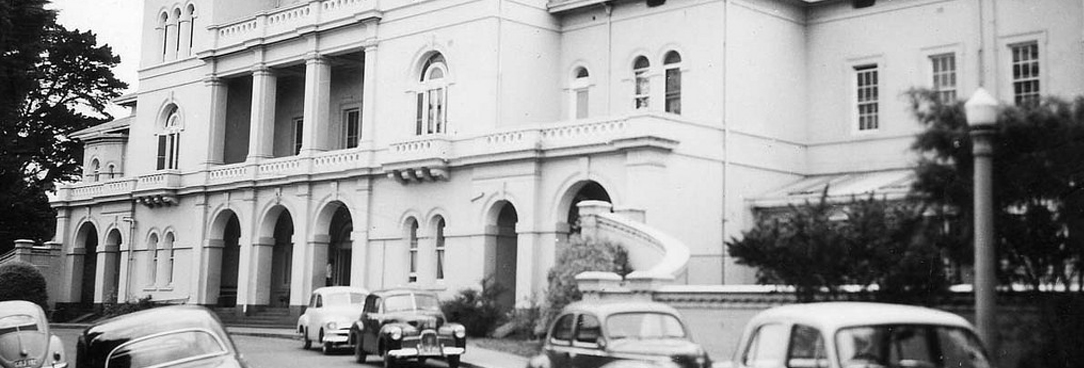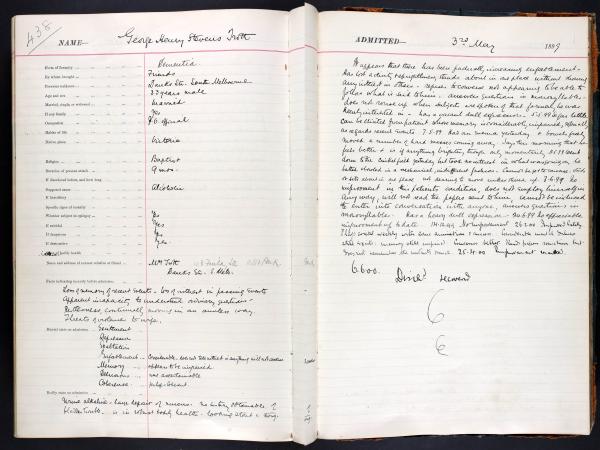
Author: Tara Oldfield
Senior Communications Advisor
Among the asylum records newly digitised by Ancestry and available on their website, you will find the case files of Paddy McShane, Harry Trott and Billy Midwinter. These men were all cricketers, and all spent time in Victoria’s Kew Asylum. While researching his book Game for Anything, Gideon Haigh did extensive research on all three men.
“I have abiding interests in cricket and in mental health, and their overlap has always intrigued me. In the era in question, sports careers were brutish and short, and regimes of care for the psychologically afflicted were spartan, which add to the stories’ pathos,” Gideon says.
Here you will find just a summary snapshot of what he found...
Paddy McShane
In the 1880s Paddy McShane was often described as ‘the best all-round athlete in Victoria’, playing both elite football and cricket. He played for Essendon Football Club and helped found Fitzroy Football Club before playing Test matches in cricket and embarking on a track and field career. In 1887 he married Jeannie Brown and together they had six children.
With his sporting career over, to provide for this ever-growing family he worked as a salesman and eventually as curator for the St Kilda Cricket Club. He struggled financially and suffered, according to notes of his committal to Kew Asylum in 1901, from bouts of what the doctors then called ‘mania’. He suffered hallucinations, his only moments of lucidity came when watching cricket.
He died in Kew of influenza in 1903.
Harry Trott
At 31 years-of-age, Harry Trott captained Australia, leading them to their first win in a five-test Ashes series in 1898. However later that same year, Harry Trott’s health took a turn. He collapsed while visiting his mother in Doncaster and ‘fell into a fit’. More seizures followed and he lapsed in and out of consciousness over the next four weeks. His health continued to decline despite recuperation time spent in the country. He suffered insomnia and memory loss and at a public appearance at the MCG in October of that year, spectators were shocked by his sickly appearance. By 1899 Joe Darling was made captain of the Australian team while poor Harry entered Kew Asylum. According to Kew case books:
Harry “refuses to converse not appearing to be able to follow what is said to him.” He “answers questions in monosyllables. Does not rouse up when subjects are spoken of that formerly he was keenly interested in – has a vacant dull expression.”
The asylum was equipped with all manner of sporting grounds and activities. Sent to the cricket green, Harry at first showed none of his former love or even interest in the game. He also displayed no interest when shown newspaper clippings of cricket news from abroad. He was diagnosed with ‘dementia’ with the cause ‘alcoholic’.
However, in February 1900 the Asylum hosted a cricket match of which Harry played, and played well! He continued to play the game against visiting teams up until April of that year when he was discharged. His file marked as ‘Recovered’ at 33 years of age. He continued to play cricket in Bendigo and South Melbourne, leading batting and bowling averages. He passed away in November 1917.
Billy Midwinter
Billy Midwinter was the first bowler to take five wickets in an innings in a Test match and the only cricketer to represent Australia against England and England against Australia.
In 1883 he married Lizzie McLaughlan and they had three children together. Sadly in 1888 Lizzie and two of the children died and the youngest son, William Jnr, began to suffer from a crippling hip problem. Billy went to stay with his sister in California Gully where he started showing signs of mental health problems, becoming increasingly violent. He was sent to Kew Asylum where he was diagnosed ‘lunatic’.
He died in December 1890 aged 39. His inquest put his death down to disease of the brain. Gideon says that during his research on Billy, he spoke to a gynaecologist who believed that Billy’s symptoms, as well as the deaths of his family members, pointed to syphilis.
Interestingly, according to the newspapers of the time, his symptoms seemed to ease somewhat when ex-cricket mate Harry Boyle came to visit.
Gideon says it’s hard to tell if cricket helped their mental health in anyway, but the game was certainly a fixture at the Kew Asylum.
“There was a strong cricket culture at Kew, including a ground, traces of which still exist. The son of the Superintendent in the late 19th century (William Trumble) fathered a Test cricketer (Hugh) too.”
Accessing asylum records
You can now view the scanned asylum patient records on Ancestry. The original records are also available to order in hard copy for viewing in our North Melbourne reading room at the Victorian Archives Centre.
Further information about researching asylum records be found on the Mental Health page of our website.
Further reading
Read more life stories about past and present players of cricket in Game for Anything: Writings on Cricket by Gideon Haigh.
Gideon is launching his new book, Scandal in Bohemia, at the Victorian Archives Centre in April. Book now to come along.
Material in the Public Record Office Victoria archival collection contains words and descriptions that reflect attitudes and government policies at different times which may be insensitive and upsetting
Aboriginal and Torres Strait Islander Peoples should be aware the collection and website may contain images, voices and names of deceased persons.
PROV provides advice to researchers wishing to access, publish or re-use records about Aboriginal Peoples





